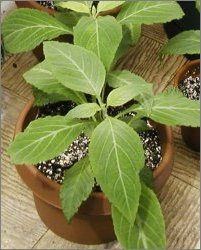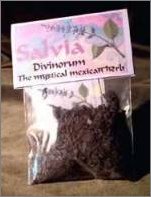The Dangers of and Arguments for Salvia -- The Completely Legal Hallucinatory Drug
by www.SixWise.com
Known as one of the (if not the) most powerful hallucinatory
agents known to man, salvia divinorum is garnering attention
from researchers and teenagers alike -- though for two totally
different reasons.
|

Users of salvia report sensations ranging from spiritual
and meditative to scary and uncomfortable. Is this herb
responsible for one teen's suicide, or does it hold
value in treating disease?
|
Salvia has intense psychedelic properties, which is why it
has been used for centuries by the indigenous people of the
Mazatec region of the Sierra Madre Mountains in Oaxaca, Mexico,
where it is native to. Now, often touted as a legal alternative
to LSD or marijuana, salvia is being sold over the Internet
to curious young adults looking to get high.
Meanwhile, researchers are trying to determine whether salvia
has any valid uses in human medicine -- before it is outlawed
in the United States.
Salvia's High Prompts Suicide Concerns
Though salvia is illegal in two states (Louisiana and Missouri),
it is currently legal in all other states, and its leaves
and liquid extracts are sold openly on Web sites and in head
shops.
However, in January 2006, 17-year-old Brett Chidester of
Wilmington, Delaware committed suicide, and his family believes
salvia's hallucinogenic properties are to blame.
Salvinorin A, which Bryan Roth, director of the Psychoactive
Drug Screening Program for the National Institute of Mental
Health, calls an "extremely potent hallucinogen"
nearly as strong as LSD, is believed to be responsible for
salvia's psychoactive effects.
The substance targets a receptor in brain cells that, Roth
says, affects our "consciousness and our perception of
reality." It's located in neurons that are involved in
mental illnesses such as depression and schizophrenia, as
well as drug abuse.
According to Chidester's mother, Karen, in a USA Today report,
Chidester wrote in an essay, found after his death, that the
meaning of the universe "is nothing."
"When I read that I thought, 'That's not him talking,
that's salvia," Karen Chidester told USA Today.
Salvia's Hallucinogenic Allure
Prompted by Chidester's suicide, Sen. Karen Peterson of Delaware
filed a bill that would ban salvia divinorum, putting it among
the ranks of illegal drugs like heroin and marijuana.
"Kids fall into a false sense of security because it's
legal. We control LSD, and we should control this," Peterson
says.
According to the U.S. Department of Justice's Drug Enforcement
Administration (DEA) -- which lists salvia as a "drug
and chemical of concern" -- salvia is largely being used
by younger adults and adolescents, who are influenced by Web
sites promoting the herb for its hallucinogenic effects.
|
Salvia's Other Names

The hallucinogenic herb salvia divinorum has many other
names, most related to its association with the Virgin
Mary (the Mazatecs believed salvia to be an incarnation
of the Virgin Mary). These include:
- Maria Pastora
- Diviner's Sage
- Sally D
- The leaf or herb of Mary
- The Shepherdess
- Ska Maria
- Ska Pastora
- Hojas de Maria
- Hojas de la Pastora
- Hierba (yerba) Maria
- La Maria
|
Users report a wide range of effects, from other-world and
out-of-body experiences to feeling they have been turned into
inanimate objects, like paint on the wall. Other users have
reported experiencing living another person's life, from birth
until death, and many report having spiritual experiences.
"Kids just don't sit back and get the munchies with
this one," said an Arkansas Drug Enforcement Agency official
in a Batesville Daily Guard report. "This is one of the
most powerful hallucinogens known to man."
Lower doses of salvia, which is usually smoked, can produce
a range of psychic effects, including:
Do Untapped Medical Uses for Salvia Exist?
On the other end of the spectrum, chemists and researchers
around the world are scrambling to find out if salvia could
be helpful in treating disease -- before it is made illegal.
Once the herb is criminalized, says Roth, it would be "almost
impossible" to get it approved for human medicinal uses.
Currently, there are no approved human uses for salvia and
the research is still in its beginning stages.
Said Dr. Joseph Banken, a clinical psychiatrist and recreational
drug researcher at the University of Arkansas of Medical Sciences,
no other chemical works quite like salvia.
"Salvia has been used for 5,000 years by the Mazatec
Indians in religious ceremonies, to communicate with spirits.
But it's new to us," Banken said. "Scientifically,
it's a bit of a puzzlement."
In an interview conducted by Banken, only 1 percent of users
said they craved or needed salvia. The effects were called
"unique" by 40 percent of users, yet several said
the effects were so intense they would not use it again. Salvia
is different from hallucinogens like LSD because it is safely
metabolized by the body, and Banken said he knows of no reports
of flashbacks.
He and a team of other researchers are looking into how salvia
works and whether or not it holds any medical or scientific
value.
" ... the substance [salvia], I caution to call it
a drug, may have a cultural or medical use. I would like to
see more research and more science before the government moves
to ban it," says Banken.
In the meantime, be aware that there is no standard for purity
for any of the salvia sold online or in stores, so what you
see may not be what you actually get.
"It is really buyer beware," Banken said.
Recommended Reading
What
are Salicylates? Could Salicylates be Zapping Your Energy
and Making You Feel Ill?
Ecstasy:
How Dangerous is This Wildly Popular Drug?
Sources
Drug
Enforcement Administration: Salvia Divinorum
USA
Today April 2, 2006
Batesville
Daily Guard March 30, 2006